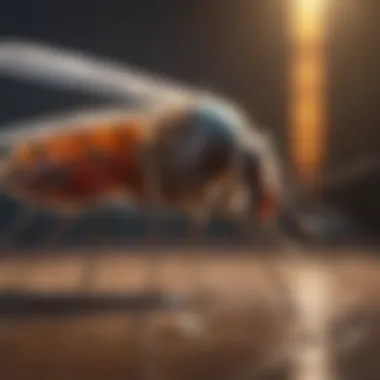Investigating Vitamins as Natural Mosquito Repellents


Intro
Mosquitoes are more than just annoying insects; they pose significant health risks worldwide. Every year, they transmit diseases such as dengue, Zika virus, and malaria. This article delves into a unique angle of mosquito deterrence: the potential role of vitamins. The study of using specific vitamins as a means of repelling these pests is gaining attention. By examining scientific research, anecdotal evidence, and practical strategies for mosquito management, readers will gain insights into how vitamins could contribute to effective mosquito control.
Understanding the Pest
Identification
To tackle mosquito infestations effectively, understanding their identification is crucial. Mosquitoes belong to the family Culicidae, and there are over 3,500 species worldwide. Key characteristics include elongated bodies, long legs, and a distinctive proboscis used for feeding on nectar and, in the case of females, blood. Some common species include the Aedes aegypti, known for transmitting diseases, the Anopheles gambiae, and the Culex pipiens. Identifying the specific species can help tailor control methods effectively.
Life Cycle
The life cycle of mosquitoes comprises four stages: egg, larva, pupa, and adult. After mating, female mosquitoes lay eggs in stagnant water. The eggs hatch into larvae, which feed on organic matter in the water. After several molts, the larvae develop into pupae. Finally, adults emerge from the pupae, ready to continue the cycle. Understanding this life cycle helps to identify the appropriate intervention points to disrupt breeding and growth.
Pest Prevention Strategies
Environment Modification
Modifying the environment is one of the primary strategies for mosquito control. Here are some tactics:
- Eliminate standing water: Remove items that can collect water, like pots and old tires.
- Improve drainage: Ensure proper drainage in yards to avoid water accumulation.
- Install screens: Use window and door screens to keep mosquitoes out of homes.
Making these changes can significantly reduce mosquito populations in your vicinity.
Physical Barriers
Physical barriers provide another effective means of prevention. Utilizing products like mosquito nets and repellant clothing can help keep these pests at bay. Additionally, patio screens allow homeowners to enjoy outdoor spaces while minimizing exposure.
Control Methods
Chemical Control
While many seek natural solutions like vitamins, chemical control remains a vital method in mosquito management. Products like DEET and permethrin are commonly used. However, be wary of their potential environmental impacts, as chemicals can affect local ecosystems.
Biological Control
Biological control involves using natural predators to manage mosquito populations. For example, introducing fish that eat mosquito larvae can significantly decrease their numbers. Additionally, certain bacteria, like Bacillus thuringiensis, specifically target mosquito larvae without harming other wildlife.
Mosquito control is not only about eradication; it's about balanced management with considerations for the environment and community health.
Intro to Mosquito Control Strategies
Understanding effective mosquito control strategies is crucial for any homeowner or individual seeking relief from these persistent pests. Mosquitoes are not only a nuisance but can also be vectors for serious diseases such as West Nile Virus, Zika virus, and malaria. Therefore, exploring various control methods is paramount for protecting health as well as enhancing outdoor experiences.
Effective strategies range from conventional chemical treatments to more natural remedies. Each method has its own benefits and considerations, determining the best approach requires understanding their mechanisms thoroughly.
Moreover, the growing concern about environmental impact makes exploring alternative methods, such as vitamin-based repellents, more relevant. Many homeowners might wonder about the balance between safety, efficacy, and ecological responsibility. The effectiveness of these strategies can result in better pest management, minimizing economic losses, and maximizing comfort during outdoor activities.


In this section, we will look closer at the foundational aspects of mosquito behavior, which informs these strategies, then explore traditional pest control methods to provide perspective on what is available before diving deeper into alternative solutions such as vitamin solutions.
Understanding the Basics of Mosquito Behavior
To develop effective control strategies, one must first understand the behavior of mosquitoes. These insects are primarily attracted to humans by a combination of carbon dioxide, body heat, and certain chemicals produced by the skin. Recognizing these attractants can aid in developing strategies to minimize encounters.
Mosquitoes generally prefer damp environments and breed in standing water. Their life cycle stages—egg, larva, pupa, and adult—provide specific windows of opportunity for control measures. For instance, eliminating standing water can significantly reduce mosquito populations, as a single female can lay several hundred eggs at a time in just a few centimeters of water.
In addition, certain species of mosquitoes are more active during specific times of the day. Understanding these patterns is essential for implementing effective control measures at times when mosquitoes are most likely to be encountered.
Conventional Pest Control Methods
Conventional pest control methods often involve the use of chemical insecticides. These can include repellents, larvicides, and adulticides. Many household products containing DEET, picaridin, or oil of lemon eucalyptus are widely used for personal protection. While effective, these methods also raise concerns regarding potential health risks and environmental impact.
In the home environment, mosquito traps, insect light traps, and fogging devices can be employed. These mechanisms are designed to either lure and kill mosquitoes or create a barrier against them. However, overreliance on chemicals often leads to resistance, rendering some treatments less effective over time.
It is important to maintain a multi-faceted approach when dealing with mosquito control by combining different strategies, including preventive measures like screens and proper waste management.
The Role of Vitamins in Pest Management
The integration of vitamins in pest management represents a potentially innovative solution for repelling mosquitoes. Recognizing their importance allows for an exploration of how these essential nutrients could serve not just as dietary enrichments but also as possible repellents against these annoyances. Understanding the functionality, applications and limits of vitamins can offer housewives and homeowners valuable insights into alternative pest control methods. These methods harmonize with a more holistic view of pest management, which is increasingly sought in today’s environmentally conscious world.
Defining Vitamins and Their Functions
Vitamins are organic compounds that are essential to normal growth and metabolism in living organisms. They play crucial roles in various bodily functions, such as immune support and energy production. Vitamins cannot be synthesized in sufficient quantities by the body and thus must be obtained through dietary sources or supplements. Common vitamins include A, C, D, E, K, and the B-complex vitamins. Each vitamin has unique physiological roles, influencing not only human health but also the interactions between organisms in the ecosystem, such as the effectiveness of mosquito repellence.
Specific Vitamins Scientifically Linked to Mosquito Control
Vitamin B1
Vitamin B1, also known as thiamine, is often suggested as a natural mosquito repellent. This vitamin is vital for energy metabolism and the synthesis of neurotransmitters. Some studies suggest that when consumed, it might alter the scent of human skin, making it less attractive to mosquitoes. The key characteristic of Vitamin B1 lies in its proposed ability to change odor profiles in the skin, thus being a beneficial choice for those seeking natural repellency options. However, evidence is largely anecdotal, and further scientific validation is necessary to confirm its efficacy.
Vitamin B6
Vitamin B6, or pyridoxine, is critical for numerous physiological functions including amino acid metabolism and the production of neurotransmitters. Its involvement in immune function is noteworthy, possibly contributing to a body’s resistance against mosquito bites. The unique feature of Vitamin B6 is its role in enhancing overall skin health, which may indirectly aid in bite prevention. While its position as a popular choice for mosquito repellent is supported by its health benefits, concrete studies validating its effectiveness specifically as a repellent remain limited.
Vitamin E
Vitamin E is known for its antioxidant properties and plays a significant role in skin health, potentially aiding in protection against cellular damage. It is frequently associated with products aiming for skin care and protection. In the context of mosquito control, Vitamin E may physically repel mosquitoes due to its natural oil base when applied topically. This key characteristic allows it to be a beneficial option for formulations aimed at creating a barrier against pests. Prospective advantages include its skin-nourishing attributes; however, the duration of effectiveness and potential allergic reactions are considerations that should not be overlooked when using it as a mosquito deterrent.
"While studies suggest certain vitamins may alter how humans are perceived by mosquitoes, comprehensive scientific backing is still needed to endorse these claims unequivocally."
The investigation into vitamins as pest management solutions widens the spectrum of understanding and serves as a foundation for further studies to grasp their complete effectiveness and limits in real-world scenarios.
Evaluating the Effectiveness of Vitamins as Repellents
The assessment of vitamins as potential mosquito repellents is critical in understanding new methods of insect control. This section aims to explore the viability of vitamins in providing a barrier against these pests. Traditional methods often rely on chemical repellents, which may not always align with eco-friendly practices. Therefore, evaluating vitamins for their effectiveness not only expands the toolkit for mosquito management but also considers safety for humans and the environment.


The idea that certain vitamins can naturally repel mosquitoes is appealing. Research and anecdotal evidence suggest that while they may not offer 100% protection, they could add an extra layer of deterrence. This approach taps into a broader desire for safer, more natural pest control alternatives. Furthermore, the assessment includes the potential benefits of using vitamins alongside established mosquito control methods, enhancing both effectiveness and safety.
Anecdotal Evidence and User Experiences
Many individuals have shared their experiences with vitamins as mosquito repellents, creating a body of anecdotal evidence. Users claim that taking Vitamin B1, for instance, can change the scent of a person’s skin, making them less attractive to mosquitoes. This perception fosters a belief that dietary changes can directly impact pest attraction.
Consumer experiences vary significantly. Some people notice a marked reduction in mosquito bites after introducing certain vitamins into their diets. Others, however, report no noticeable difference, pointing to the inconsistency of human reactions to supplements. This divide may be influenced by individual body chemistry, which suggests that efficacy could vary among users.
Scientific Studies Supporting Vitamin Efficacy
Research into the effectiveness of Vitamin E has gained traction due to its roles as an antioxidant and skin protectant. Notably, certain studies indicate that applying vitamin E topically may provide a modest barrier against mosquito bites. Vitamin E acts as a skin moisturizer, potentially making it harder for mosquitoes to penetrate the skin barrier.
A study published in the Journal of Vector Ecology found that individuals using Vitamin E on their skin experienced fewer bites compared to a control group. Although the results are promising, the effects may differ based on concentration and skin absorption abilities. Further investigation is necessary to establish dosage guidelines and to confirm these outcomes in larger, more diverse populations.
Research on B Vitamins for Mosquito Deterrence
Several studies have focused on B vitamins, especially Vitamin B1 and B6, and their potential as mosquito deterrents. These vitamins are hypothesized to alter body odor in a way that makes individuals less appealing to these insects. For example, a small scale experiment suggested that higher levels of Vitamin B1 in a person’s bloodstream resulted in fewer mosquito landings.
However, the scientific evidence remains mixed. While some studies support the theory, others find no significant difference in mosquito attraction related to B vitamin intake. The existing research provides valuable insights but also highlights the complexity of factors influencing mosquito behavior, indicating that more rigorous, controlled studies are required to draw definitive conclusions.
Understanding the limitations and effects of vitamins on mosquito control is necessary for developing comprehensive strategies. Through evaluation of both anecdotal and scientific evidence, we can foster better practices that may complement traditional pest management methods without compromising health or the environment.
Comparing Vitamins with Other Natural Repelling Agents
In the quest for effective mosquito control, vitamins are often discussed alongside other natural solutions. This comparison is important not only to gauge the effectiveness of vitamins but also to explore their potential benefits in combination with other agents. Understanding these relationships can inform households looking to protect themselves from mosquito bites without relying solely on synthetic repellents.
Natural agents like herbal remedies and essential oils offer diverse approaches to pest management. While vitamins may provide a unique method of deterrence, their effectiveness may vary when placed next to these alternatives. This section will focus on some of the main natural substances that are used in mosquito repellence and compare their uses with vitamins.
Herbal Remedies and Their Effectiveness
Herbal remedies have been utilized for centuries in various cultures for pest control. Plants like citronella, lemongrass, and neem are well-known for their insect-repelling qualities. Citronella, for instance, contains compounds that mosquitoes find repugnant.
Some key points regarding herbal remedies include:
- Wide Availability: Many herbs can be grown easily at home. This access allows for fresh application, which may enhance potency.
- Low Toxicity: Generally, herbal compounds are considered safer for humans and pets compared to synthetic repellents.
- Complementary Effects: Using vitamins in combination with herbs may increase overall effectiveness. For example, consuming B vitamins may enhance personal defense while applying citronella oil creates a physical barrier.
However, there are limitations too. The effectiveness of these herbal solutions can be inconsistent, influenced by concentration, environmental factors, and application methods.
"Herbal solutions are appealing, but they need to be used with care and understanding of their unique properties."
Essential Oils as Alternatives
Essential oils represent another avenue for natural mosquito deterrence. Oils such as lavender, eucalyptus, and tea tree have shown potent repelling properties. Their concentrated nature allows for a powerful solution in smaller quantities. Key aspects of essential oils include:
- Concentration: Essential oils can be more effective in small amounts compared to herbs. Their strong aroma is often enough to ward off mosquitoes.
- Diverse Options: The variety of essential oils allows individuals to choose based on scent preference, which may encourage more consistent use.
- Potential Synergy: Like herbal remedies, the combination of vitamins and essential oils may offer synergistic benefits. For instance, diffusing lavender essential oil while consuming vitamin E could create an integrated approach to repel mosquitoes.
However, users should be cautious of allergic reactions and skin sensitivity, which can occur with some concentrated oils.


Limitations of Using Vitamins for Mosquito Control
While vitamins have gained attention as potential mosquito repellents, it is critical to acknowledge their limitations within the broader context of pest management. The effectiveness of these nutrients does not exist in isolation. Instead, vitamins can be part of diverse strategies, yet they are not a guaranteed solution. Understanding these limitations is essential for realistic expectations and informed decisions.
First, not all vitamins are equally effective, and even those with some scientific backing may not work universally for every individual. Variables like skin chemistry, diet, and overall health can alter how these vitamins affect mosquito attraction. Additionally, the duration of effectiveness might also be short-lived, necessitating frequent applications or consumption, which can be impractical for many.
Potential Side Effects and Considerations
Using vitamins, especially in higher doses, can lead to potential side effects for some people. Here are a few concerns to consider:
- Overconsumption: Large doses of certain vitamins may cause toxicity. For example, excessive Vitamin B6 can lead to neurological issues.
- Skin Reactions: Some individuals might experience skin irritation when applying vitamin formulations directly.
- Interactions with Medications: Vitamins can interact with prescription and over-the-counter medications, affecting their efficacy or causing adverse reactions.
Considering these factors before relying solely on vitamins for mosquito control is essential. Individual assessment and consultation with healthcare professionals can provide valuable guidance.
Misconceptions Regarding Vitamin Usage
Common misconceptions about vitamins in pest management can mislead consumers. It is crucial to debunk these myths for a clearer understanding:
- Myth: Vitamins Alone Are Sufficient for Mosquito Control: Many assume that taking vitamins will wholly protect against mosquito bites. This is misleading; vitamins may assist but should not replace other control measures.
- Myth: All Vitamins Have the Same Effectiveness: Not every vitamin is equally effective against mosquitoes. While some, like Vitamin B1, have anecdotal support, the scientific evidence varies significantly.
- Myth: Natural Equals Safe: The perception that "natural" solutions are entirely safe can lead to neglecting potential side effects and interactions, which require careful consideration.
In a time when people seek out alternatives to chemical repellents, a balanced assessment of vitamins is vital. Acknowledging the limits imposed by science and personal health can lead to better pest management plans that harmonize various techniques.
"Vitamins can play a role in mosquito repellence but must be viewed as part of a larger strategy rather than a standalone solution."
Being well-informed allows homeowners and individuals to make educated choices about pest management. While vitamins may contribute, they should not overshadow the established practices already in place. Knowing their limitations helps individuals integrate them more effectively into their overall pest management plans.
Ending: A Balanced Approach to Mosquito Management
Mosquito management is a complex issue that requires a multifaceted approach. In particular, integrating vitamins into broader pest control strategies can offer an intriguing avenue for exploration. This article sheds light on the potential role of vitamins, emphasizing how they may complement traditional methods rather than replace them entirely.
Utilizing vitamins as a part of mosquito management can provide a holistic method of deterring these pests. For instance, combining vitamin B1 or B6 with physical barriers, like screens or repellent clothing, can create a layered defense. This can be beneficial not only for reducing mosquito presence but also for promoting a more sustainable approach to pest control.
Consideration must also be given to the efficacy of various vitamins and the importance of scientific validation. Not every anecdotal claim supports the facts, and consumers must differentiate effective strategies from misleading information. In this context, vitamins can be likened to a supplementary measure that can enhance overall management efforts.
Part of a balanced strategy includes awareness of the potential drawbacks associated with vitamin usage. While they have shown promise, their effects may vary widely from person to person, depending on individual factors like metabolism and overall health.
"A comprehensive approach to mosquito management harmonizes the use of vitamins, environmental control, and traditional pest repellents, creating a balanced ecosystem."
Thus, consumers are encouraged to adopt an informed stance when integrating vitamins into pest control efforts. Continuous evaluation of outcomes is crucial to refining strategies that work best for each household. This means actively staying updated on emerging research to understand where vitamins fit within the bigger picture of mosquito control.
Integrating Vitamins into Broader Pest Control Strategies
Integrating vitamins into broader pest control strategies involves several key considerations. First, it is valuable to look at how vitamins can be used alongside other protective measures. For example, using vitamin E topically may provide an added layer of protection when combined with the use of mosquito nets or repellents such as DEET. Incorporating dietary sources of vitamin B complex may also enhance the body’s natural defenses against mosquito bites.
Additionally, education plays a significant role. Homeowners should understand the specific vitamins that can be beneficial and the ways they can be effectively applied. For instance, cooking foods rich in vitamin B1, like whole grains and beans, may help in increasing resistance to mosquito attraction in an indirect manner.
Future Research Directions on Vitamins and Insect Repellents
Future research directions should focus on the definitive link between vitamins and insect repellency. While prior studies indicate some efficacy, there is a need for targeted clinical trials that can provide clearer insights. Specifically, research can explore:
- The effectiveness of long-term vitamin supplementation on measurable repellency against various mosquito species.
- The optimal dosage and method of delivery for vitamins as repellents, whether topical applications or dietary intake are more effective.
- The ecological impacts of widespread vitamin use as insect repellents on other non-target organisms in the environment.
Only through extensive research can the scientific community clarify how vitamins might serve as a viable tool in integrated pest management. Homeowners looking to adopt such solutions must remain cautious, informed, and ready to adapt their strategies based on upcoming findings.







